
Structured routines are essential for pre-school children to help them develop a sense of predictability and security in their daily lives. In fact, research has shown that children thrive in environments with a consistent routine, as it helps them feel safe, secure, and in control of their surroundings.
A structured routine can take many forms, but it generally involves a predictable sequence of activities that happen at the same time every day. For example, a typical pre-school routine might involve a morning circle time, followed by free play, snack time, story time, and then more free play. The is that it is consistent and predictable.
One of the main benefits of a structured routine is that it helps children feel secure and in control. By knowing what to expect each day, children can develop a sense of confidence and independence, which can help them build social skills and relationships with other children. Additionally, a structured routine can help children learn to manage their own time and develop good habits that will serve them well as they grow older.
In pre-school, a structured routine can also help teachers manage their classrooms more effectively. By having a predictable routine, teachers can plan their lessons and activities around specific times of the day, which can help them stay on track and avoid disruptions. This can be especially important for pre-schoolers, who may have short attention spans and need frequent breaks throughout the day.
Another benefit of a structured routine is that it can help children learn important social and emotional skills. For example, by participating in circle time each day, children can learn how to take turns, listen to others, and express themselves in a group setting.